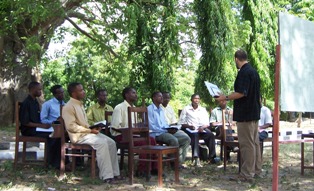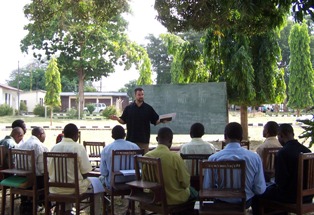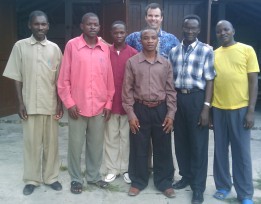For the past eight months, I’ve been teaching two theology classes at an Anglican seminary in a community called Bugaruni. As the academic year finishes, I sensed the Spirit prompting me to share the Gospel message once again with these students, most of whom are pastors (or will be soon) in Anglican churches throughout Tanzania, but also to dig to find out where their faith really lies. This branch of Anglicanism is very liturgical and formal, and unfortunately not very evangelical (doesn’t focus much on the Gospel of Christ.)
I began by asking the familiar question, “If you were to die tonight, how sure are you that you would go to heaven?” And the follow-up, “Why do you think God will let you into heaven?” The answers I received where staggering and eye-opening as to where these pastors were placing their faith. Pastor Kulwa said that he was 50% sure he’d go to heaven, meaning he had no security whatsoever. When I asked him why, he said, “Because I’ve made many mistakes.” Others were more optimistic. Pastor Mhema said he was 70% sure he’d make it to heaven, and when I asked why, he said, “As long as I pray and repent of my last sins before I die, then I will go to heaven.” When I asked him what happens if he dies before getting a chance to repent of those final sins, he said he will not be allowed into heaven.
As the pastors continued to share their hope for salvation, it became crystal clear that every one of them was trusting in something they had to do, or had done, to gain entrance into heaven. The oldest member of the class, Bwana Sentimea, said, “I am hoping God lets me into heaven, because I’ve tried to do what is right for the most part. I think He’s loving, and it shouldn’t be a problem.” Pastor Nawa surprised me when he quoted Ephesians 2:8-9, “For it is by grace you have been saved, through faith—and this not from yourselves, it is the gift of God—not by works, so that no one can boast.” Then, without even taking a breath, he said, “So as long as I do what is good and don’t boast about it, then I’ll get into heaven.” Great verse, but he totally missed the point!
In the entire class, only one student said he was 100% sure he would go to heaven. When the class heard this, they all openly laughed at him and said he was crazy. When I asked him why he was so sure, again my heart sank as Gerikoshua said, “Well, I just feel it in my heart. It is such a strong, good feeling, so I know it will happen.”
After listening to all the answers, I prayed a silent prayer for wisdom and understanding, and launched into a simple explanation of the Gospel from passages like Romans 10:9, “If you confess with your mouth, “Jesus is Lord,” and believe in your heart that God raised him from the dead, you will be saved.” I drove the students again and again back to Christ. Acts 4:12, “Salvation is found in no one else (than Jesus Christ), for there is no other name under heaven given to men by which we must be saved.” And Jesus’ words in John 14:6, “I am the way, the truth, and the life. No one can come to the Father except through me.” I told them that in essence, every answer that each student had shared with me showed that their faith truly rested in themselves, their works, their feelings, their efforts, to make it into heaven. Not one of them said their faith was in Christ, and what he had done. I shared with them that our best works are nothing more than “filthy rags” (Is.64:4), and only through the work of Christ on the cross can we have forgiveness for our sins.
Then I shocked these pastors when I said that in fact, I am absolutely 100% sure that I will go to heaven when I die, based on 1 John 5:11-12, “And this is the testimony: God has given us eternal life, and this life is in his Son. He who has the Son has life; he who does not have the Son of God does not have life.” As they sat absorbing this, I told the class, “It is not because I am a good man, for I oftentimes am not, and not because I feel anything strongly, for there are times when I do not, and not because I will get in a final prayer of repentance before I die, for I may not. But I have this confidence because of the powerful work of Christ on the cross, and the forgiveness I have for past, present and future sins through His shed blood on my behalf. I have placed my faith in Jesus, not in myself and my works, to get me into heaven. And I know Jesus is able. In fact, he has adopted me into his family (Eph.1:5), written my name in the book of life (Luke 10:20), I’ve been sealed by the Spirit (Eph.1:13), and I belong to the King!”
As the pastors began nodding their heads, I shared Rev.3:20 with them, “Here I am! I stand at the door and knock. If anyone hears my voice and opens the door, I will come in and eat with him, and he with me.” I sensed the Spirit’s urging, and asked if any of these men recognized that their faith had been misplaced, and wanted today to place their faith in Christ, and ONLY in Christ. First one, then another, then another stood to their feet. Six pastors, out of the nine who were present, all stood up and publicly confessed their desire to trust in Christ and be saved. With overflowing joy we prayed together, and all heaven rejoiced with us! I share this so you can rejoice with us as well!
Please continue to pray for Pastors Nawa, Kimanga, Kulwa, Chitanda, Kahwili and Mhema, that their new faith will grow to maturity as they lead their churches to likewise trust in Christ alone. “On Christ the Solid Rock I stand, all other ground is sinking sand!”
Pressing on by God’s grace, Eric



